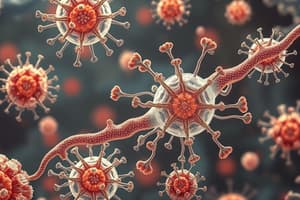Podcast
Questions and Answers
Qu'est-ce que la microbiologie étudie principalement ?
Qu'est-ce que la microbiologie étudie principalement ?
- Les organismes marins
- Les organismes géants
- Les organismes volants
- Les organismes microscopiques (correct)
Quelle est la caractéristique principale des cellules bactériennes par rapport aux cellules eucaryotes ?
Quelle est la caractéristique principale des cellules bactériennes par rapport aux cellules eucaryotes ?
- Elles manquent d'organites liés à la membrane (correct)
- Elles ont un noyau délimité par une membrane
- Elles sont incapables de provoquer des maladies
- Elles contiennent de la cellulose dans leur paroi cellulaire
Quel rôle majeur les bactéries jouent-elles dans les écosystèmes ?
Quel rôle majeur les bactéries jouent-elles dans les écosystèmes ?
- Contrôler le climat
- Détruire les plantes
- Causer des maladies
- Maintenir l'équilibre écologique (correct)
Comment les virus se différencient-ils des bactéries ?
Comment les virus se différencient-ils des bactéries ?
Quel est le principal mode de reproduction des virus ?
Quel est le principal mode de reproduction des virus ?
Quelles sont quelques exemples notables de virus mentionnés dans le texte?
Quelles sont quelques exemples notables de virus mentionnés dans le texte?
Qu'est-ce que la reproduction virale nécessite exclusivement?
Qu'est-ce que la reproduction virale nécessite exclusivement?
Quelles avancées ont permis le développement de vaccins et de thérapies antivirales selon le texte?
Quelles avancées ont permis le développement de vaccins et de thérapies antivirales selon le texte?
Quel type d'alternatives aux antibiotiques suscite un regain d'intérêt selon le texte?
Quel type d'alternatives aux antibiotiques suscite un regain d'intérêt selon le texte?
Que révèle la recherche sur le microbiote selon le texte?
Que révèle la recherche sur le microbiote selon le texte?
Flashcards are hidden until you start studying
Study Notes
Microbiology: A Diverse World of Life's Tiniest Organisms
Microbiology is the scientific discipline focused on studying microorganisms, which encompass a wide range of life forms too small to see with our naked eyes. These minute entities have profound impacts across all areas of biology, including medicine, agriculture, environmental science, and industry. Let's take a closer look at some key aspects within this vast field: bacteriology and virology.
Bacteriology
Bacteria form one major branch of microorganisms, accounting for nearly half of Earth’s biomass. They exhibit incredible adaptability and diversity, inhabiting almost every environment imaginable — from deep sea vents to human bodies. Bacterial cells typically lack membrane-bound organelles and are surrounded by rigid cell walls containing peptidoglycan. Many bacteria play pivotal roles in ecosystem balances, while others contribute to diseases like tuberculosis, cholera, and Lyme disease. Since their discovery more than three centuries ago, researchers have explored numerous facets of bacterial behavior such as growth, metabolism, genetics, ecology, and pathogenesis.
Virology
Viruses represent another important group of microorganisms, characterized by their highly selective dependence upon host cells. Unlike bacteria, viruses do not possess cells; instead they consist of genetic material, either DNA or RNA, encased in a protective protein shell called a capsid. Viral reproduction occurs exclusively inside living hosts, where they hijack molecular machinery to replicate themselves. Some notable examples of viruses include HIV, influenza virus, and SARS-CoV-2, each posing significant challenges to global health. Advancements in virological knowledge have led to breakthroughs in vaccine development and antiviral therapies, saving countless lives.
La Vue Générale de la Microbiologie
The study of microbes has revolutionized diverse fields through its practical applications and fundamental insights into biological processes. Increasing concerns over antibiotic resistance have triggered a surge of interest in alternative strategies, such as phage therapy and synthetic biology, to combat microbial infections. Moreover, microbiome research reveals how these tiny creatures influence human physiology and disease susceptibility. As we continue to unravel the mysteries of microbiological systems, exciting opportunities emerge for pioneering innovations and enhancing our quality of life.
In conclusion, microbiologists venture beyond what meets the eye to reveal fascinating realms of life, providing unparalleled understanding of planetary complexity and advancing solutions to pressing societal issues.
Studying That Suits You
Use AI to generate personalized quizzes and flashcards to suit your learning preferences.




